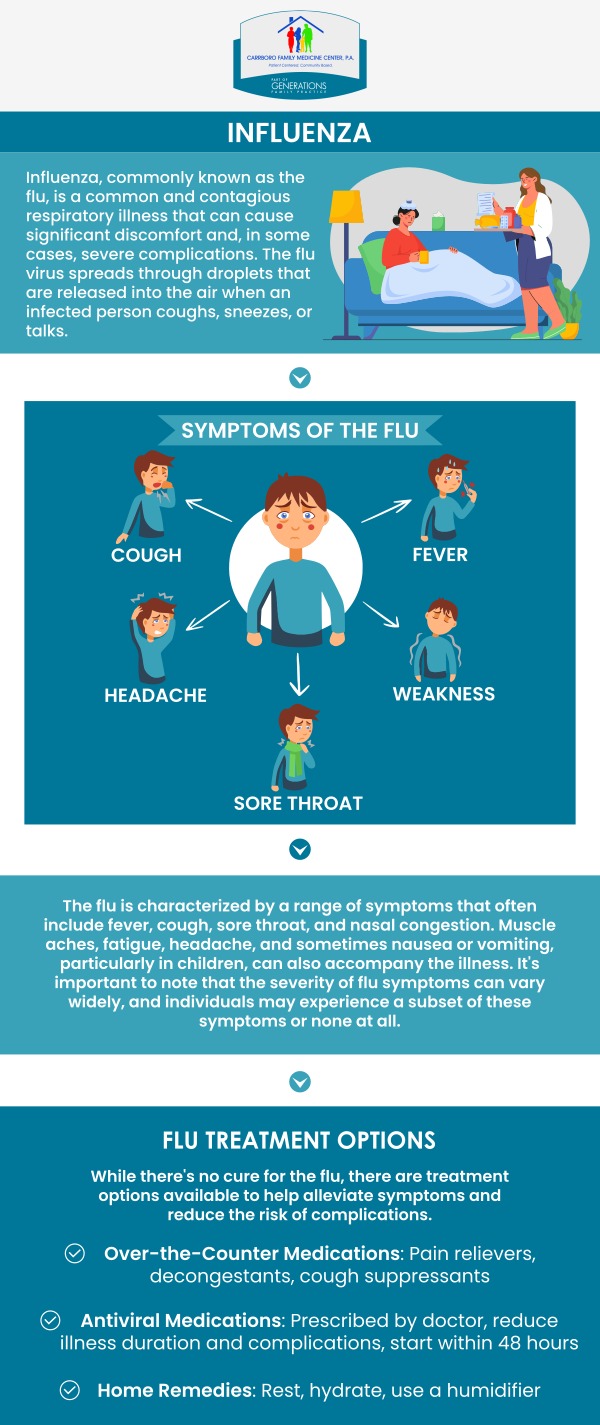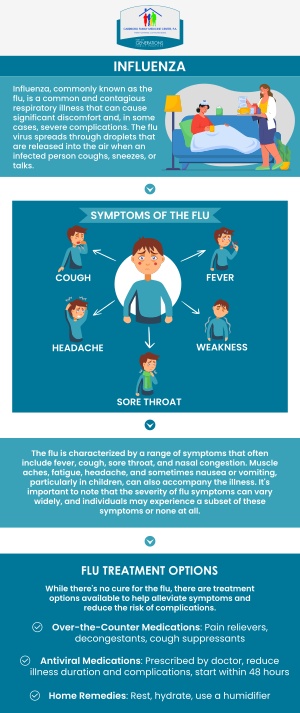When to Seek Medical Attention for the Flu
The flu (influenza) is a highly contagious viral infection that affects the respiratory system, causing symptoms like fever, cough, body aches, and fatigue. At Carrboro Family Medicine Center, we provide prompt care for flu-related concerns. If you’re experiencing severe symptoms such as high fever, shortness of breath, or chest pain, our experienced team is here to assess your condition and provide the necessary treatment to help you recover quickly. For more information, contact us or book an appointment online. We are conveniently located at 610 Jones Ferry Rd Suite 102, Carrboro, NC 27510.


Table of Contents:
What are the common symptoms of the flu?
When should I see a doctor for flu symptoms?
What are the signs of severe flu complications?
How can I differentiate between the flu and a common cold?
We have observed that the flu can lead to serious complications such as pneumonia and bronchitis, or even hospitalization. Our goal is to help you know the typical flu symptoms, which include:
● Fever: A high fever, often accompanied by chills, is one of the most common symptoms of the flu.
● Cough: Whether it’s dry or produces phlegm, coughing is a hallmark symptom of the flu.
● Sore Throat and Runny Nose: Many flu patients experience a sore throat and a runny or stuffy nose, causing pain and discomfort.
● Body Aches and Fatigue: The flu can cause muscle aches and pains, particularly in the head, back, arms, and legs, as well as fatigue.
● Headache: Flu symptoms often include headaches, which can vary in intensity from mild to severe.
● Loss of Appetite: The flu can also cause a loss of appetite, leading to decreased food intake and possible weight loss.
● Nausea and Vomiting: This symptom is more common in children, but adults can also experience digestive issues such as nausea, vomiting, and diarrhea.
Influenza viruses are responsible for the extremely contagious respiratory illness commonly referred to as the flu. It can affect everyone differently, but certain warning signs should prompt a visit to our medical practice. Understanding when to get medical help for flu symptoms is crucial in preventing further complications and speeding up recovery time.
● If there is no change in your symptoms after more than a week, you should book an appointment to see one of our healthcare professionals at Carrboro Family Medicine. The flu typically lasts around five to seven days, so anything beyond that could indicate a more severe infection or a different illness altogether.
● If your symptoms improve but then suddenly worsen, don’t hesitate to reach out to us.
Please get in touch with us right away if you encounter any of these serious symptoms:
● High fever
● Difficulty breathing
● Persistent cough
● Body aches
● Confusion or disorientation
● Bluish or purplish skin
● Seizures
● Vomiting or diarrhea
● Respiratory distress
Certain groups of people are at higher risk of complications from the flu and should therefore seek medical attention at the first sign of flu symptoms. These groups include people over the age of 65, pregnant women, those with compromised immune systems, and those suffering from long-term illnesses, including heart disease or asthma.
Trust our team to guide you through your flu symptoms and ensure your health is our highest priority.
We prioritize your health and believe in equipping our patients with the knowledge to identify potential health threats. Severe influenza complications can display a range of symptoms that require immediate professional attention. Contacting our knowledgeable staff right away is advised if you or any members of your family suffer from one or more of the following symptoms:
● Respiratory distress: difficulty breathing or a sensation of not getting sufficient air, accompanied by chest or abdominal pain.
● Nausea, Vomiting, and Diarrhea: Serious side effects such as electrolyte imbalances and dehydration might result from persistent vomiting or diarrhea.
● Dehydration: Signs include extreme thirst, dry mouth, decreased urine output, or dizziness when standing.
● Muscle Aches: Persistent body-wide muscle pain.
● Facial Changes: Bluish lips or face, swelling of the cheekbones, eyes, or lips.
● Fluctuating Symptoms: Flu-like symptoms that improve but then return with a fever and worsened cough can signal a secondary infection, like pneumonia.
● Eye Infections: Redness, swelling, or discharge from the eyes.
● Neurological Problems: Headache, neck stiffness, or light sensitivity.
In children, severe flu complications can present as an inability to wake up or interact, refusal to be held, or absence of tears when crying.
These symptoms are not exhaustive, and anyone concerned about their condition should seek immediate medical attention. Our medical professionals are ready to provide immediate care. Don’t ignore potentially serious symptoms. We are here to provide timely intervention and professional medical assistance when you need it most.
The flu and a common cold share similar symptoms, but there are key differences. Flu symptoms are typically more severe and appear rapidly; they frequently include exhaustion, body aches, and a high fever. In contrast, a cold generally has milder symptoms like a runny nose, cough, and sore throat and tends to clear up in a couple of days to a week. Should your symptoms worsen or persist longer than normal, it’s important to seek medical advice to rule out the flu or other conditions.
1. Onset and Duration: While colds typically resolve within a week, flu symptoms can last longer and are often more severe.
2. Fever: A high fever (101-104°F) is more indicative of the flu. Our healthcare professionals at Carrboro Family Medicine can help manage your fever and alleviate discomfort.
3. Body Aches and Fatigue: Severe body aches, weakness, and fatigue are common with the flu but not with a common cold.
4. Respiratory Symptoms: The presence of respiratory symptoms such as a dry cough or difficulty breathing could indicate the flu. Our healthcare professionals are trained to help manage these symptoms and provide appropriate treatment.
5. Head and Sinus Pain: Severe headaches and sinus pressure are more common with the flu. Our team at Carrboro Family Medicine can provide relief and management strategies for these symptoms.
6. Gastrointestinal Symptoms: If you’re experiencing symptoms like nausea, vomiting, and diarrhea, it may suggest the flu. Our team can help manage these symptoms and prevent dehydration.
7. Complications: The flu can lead to severe health problems like pneumonia and can also exacerbate pre-existing conditions such as asthma or heart conditions.
At Carrboro Family Medicine, we provide comprehensive care to help prevent and manage such complications.
If you experience any flu-related symptoms such as a high fever that persists, severe body aches and fatigue, a persistent cough or shortness of breath, confusion, or chest pain, it’s important to seek immediate care at Carrboro Family Medicine. Our team is here to provide a thorough evaluation and effective treatment to help you recover and manage flu symptoms. For more information, contact us or book an appointment online. We are conveniently located at 610 Jones Ferry Rd Suite 102, Carrboro, NC 27510. We serve patients in Chapel Hill NC, Southern Village NC, Fearrington NC, Blands NC, and surrounding areas.
Check Out Our 5 Star Reviews



Additional Services You May Need
▸ Annual Physical Exam
▸ Primary Care
▸ Hypertension Management
▸ Chronic Diseases
▸ Diabetes Management
▸ Immunizations
▸ Lab Testing
▸ Sports Physicals
▸ STD Testing
▸ Allergy Treatment
▸ Acute Illness



